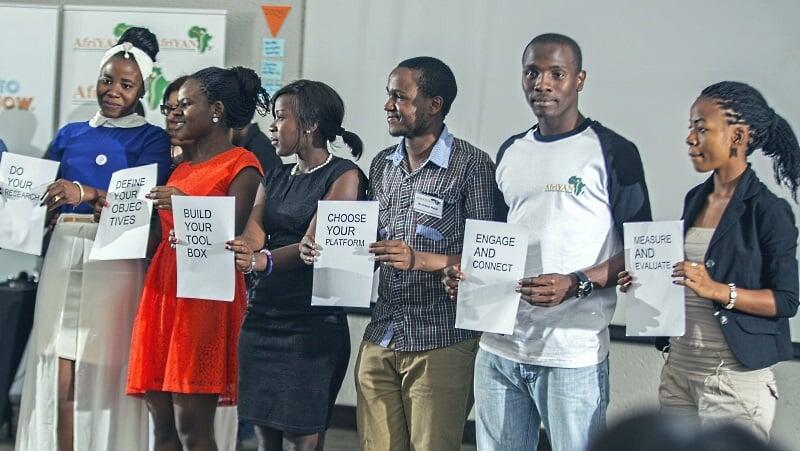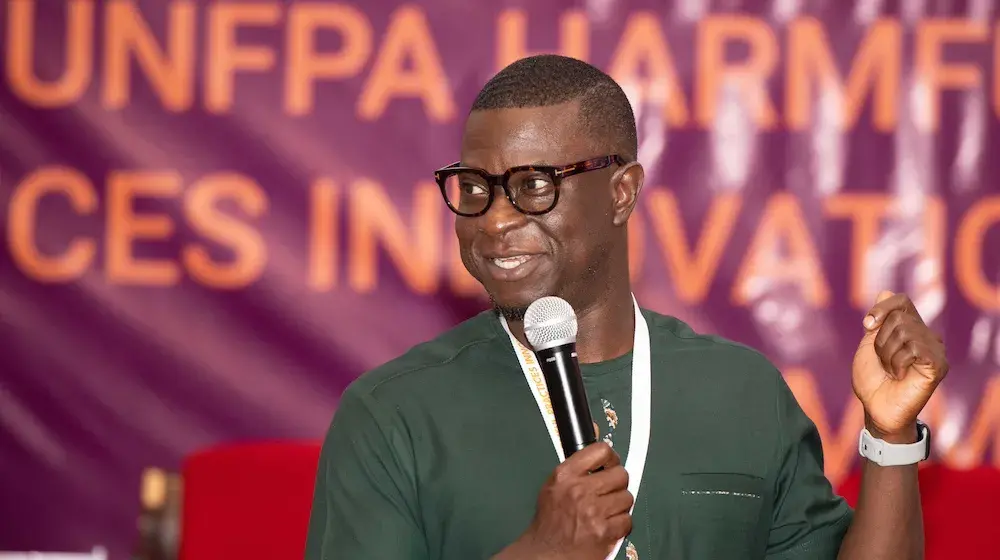
In Eastern and Southern Africa, adolescents and young people aged between 10 and 24 make up an estimated 33 per cent of the population.
JOHANNESBURG, South Africa, 5-10 October 2015 – A week-long training of young leaders from Eastern and Southern Africa culminated in the revitalized Africa Youth and Adolescents Network on Population Development (AfriYAN). During this meeting a new executive committee was elected to steer the regional network over the next two years.
The new executive team includes representatives from Eritrea, Mozambique, South Africa, Namibia, Burundi and Uganda, plus two mentors from the previous Executive Committee, Judith Oketch and Yemurai Nyoni. The mentors will provide support to the new executive team as they assume the AfriYAN leadership.
The meeting brought together 45 passionate youth activists from 23 different countries. It was organized jointly by the United Nations Population Fund (UNFPA), United Nations Educational, Scientific and Cultural Organization (UNESCO) and the Joint United Nations Programme on HIV/AIDS (UNAIDS).
Since its inception in 2005, AfriYAN has provided a key platform for youth advocacy on sexual and reproductive health and rights and population development issues. It was established to create an effective network of youth organizations to promote and foster adolescent and youth participation in the fight against HIV/AIDS, poverty, unemployment, and gender-based inequalities and iniquities, the promotion of sexual and reproductive health and general youth development.
In September, the UN General Assembly approved the Sustainable Development Goals (SDGs), which address 17 global challenges, many impacting on young people. At the AfriYAN meeting, discussions centered on how implementation of the new SDG agenda could be maximized for young people in their respective countries, among other development frameworks such as the Eastern and Southern Africa Ministerial Commitment. Young people discussed population impacts, such as the demographic dividend for Africa, which will affect development issues and challenges facing young people across Africa today.
The newly elected President of AfriYAN Eastern and Southern African Region, Tikhala Itaye, from Namibia, said the power to achieve effective sustainable change lies with young people. “Young people are key partners rather than beneficiaries. We are assets and not liabilities. It’s up to us to take the lead in fostering economic and social development.” To fulfill the potential of youth and adolescents, investment is key, she said.
Young people need education, health, skills, employment and an opportunity to achieve their full potential, said Dr. Asha Mohamud, UNFPA Adolescent Sexual and Reproductive Health (ASRH) Regional Policy Adviser. Youth issues are critical for the Demographic Dividend and AfriYAN has the potential to contribute successfully to the implementation of the SDGs, she said. She urged participants to keep track of progress on youth issues in the SDGs: "What is not measured is not invested in!"
Young people across the region face numerous challenges, including child marriage, gender-based violence, HIV & AIDS, and unintended pregnancies, which create major vulnerabilities. Every day, 39,000 girls under 18 years old become child brides, which translates into 27 girls who are forced into marriage every minute.
“It is critical for AfriYAN to mobilize young people to take a lead and own the post-2015 agenda,” said Dr. Patricia Machawira, Regional HIV and Health Education Advisor with UNESCO. “The SDGs cannot be realized without meaningful engagement and leadership by young people.”
Dr. Pierre Somse, Deputy Regional Director for UNAIDS Eastern and Southern Africa, said that ending the AIDS epidemic is dependent on social justice, which demands equity in education, employment and health for young people. The newly adopted SDGs provide us with our greatest opportunity yet to do things differently for this generation. We must make the conscious decision to empower young people to take control of their own health choices.
AfriYAN advocates for youth sexual and reproductive health and rights
AfriYAN, with the support of UNFPA and in collaboration with UNESCO, UNAIDS and other regional UN bodies in Africa, has succeeded in providing an elevated platform for many young people across the continent. AfriYAN members have influenced the Post-2015 Development Agenda discussions and negotiations, as well as the ICPD Programme of Action, the UN Secretary General’s Global Strategy on Women, Children and Adolescents Health, the discussions on Financing For Development, and the ESA Commitment on CSE and YFS.
***
UNFPA, the United Nations Population Fund, is the lead UN agency for delivering a world where every pregnancy is wanted, every child birth is safe, and every young person's potential is fulfilled. UNFPA East and Southern Africa Regional Office (ESARO) works in 23 countries in the region as a catalyst for change. Visit http://esaro.unfpa.org, ‘like’ UNFPA ESARO on Facebook and follow @UNFPA_ESARO on twitter.
United Nations Educational, Scientific and Cultural Organisation (UNESCO) contributes to the building of peace, poverty eradication, lasting development and intercultural dialogue, with education as one of its principal activities to achieve this aim. Across Eastern and Southern Africa, UNESCO supports the work towards eradicating HIV and AIDS through universal access to prevention programmes, treatment, care and support. Visit www.unesco.org.
UNAIDS, the Joint United Nations Programme on HIV/AIDS, is an innovative partnership that leads and inspires the world in achieving universal access to HIV prevention, treatment, care and support. Visit www.unaids.org.
For more information or any media inquiries, please contact:
Paska Kinuthia, UNAIDS: Tel: +27 11 519 6933; +27 82 909 2638; kinuthiap@unaids.org
Corrie Butler, UNESCO: Tel: +27 747553039; cg.butler@unesco.org
Adebayo Fayoyin, UNFPA: Tel. +27 11 6035308; +27 79 5170320; fayoyin@unfpa.org



